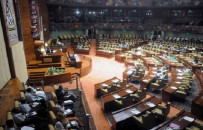Courts to be made wheelchair friendly
SHC orders accessibility facilities in Sindh's district courts

The Sindh High Court (SHC) has directed district courts across the province to ensure the installation of ramps, wheelchairs, and special washrooms for persons with disabilities.
The directives were issued by Acting Chief Justice Zafar Ahmed Rajput under the "Access to Justice Project", aimed at removing physical barriers to court access for differently-abled people. The initiative is being implemented across all 28 districts of the province.
According to official sources, 16 districts have so far submitted compliance reports confirming the availability of ramps and wheelchairs within court premises. Moreover, a special washroom for persons with disabilities has been constructed at Karachi's City Court.
The SHC has directed all district and sessions judges to submit progress reports and to personally verify that these facilities are not only installed but also fully functional.
Legal experts and members of civil society have welcomed the move, terming it a vital step towards ensuring equal access to justice. They underscored that accessibility for persons with disabilities is a constitutional right under Article 25-A, which guarantees equality before the law.
Experts also highlighted the importance of routine inspection and maintenance of accessibility features such as ramps and wheelchairs, to ensure they remain operational and serve their intended purpose effectively.
Paperless digital courts
The Sindh High Court has formally launched its paperless digital courts under the "E-Courts Vision 2030 - Go Green" initiative, signalling a major step towards a fully digitised and environmentally friendly judicial system.
According to officials, traditional paper-based proceedings have now been replaced with a fully digital platform, allowing lawyers to file cases, receive objections, and obtain court orders electronically. To facilitate this transition, smart rostrums and display screens have been installed within courtrooms to streamline the presentation of cases.
The system was inaugurated with a single bench, headed by Justice Adnan Iqbal Chaudhry, hearing four company-related cases using the new digital infrastructure. The paperless initiative has initially been introduced for company matters, with plans underway to extend the system to other case categories in the coming phases.
Under the new setup, both parties will present their arguments through digital case files, reducing paper consumption, enhancing transparency, and increasing overall efficiency.
The reform is aimed at modernising court procedures and aligning the judiciary with global technological advancements.
The legal fraternity has largely welcomed the initiative, hailing it as a significant step towards a transparent, efficient, and eco-friendly justice system.

























COMMENTS
Comments are moderated and generally will be posted if they are on-topic and not abusive.
For more information, please see our Comments FAQ